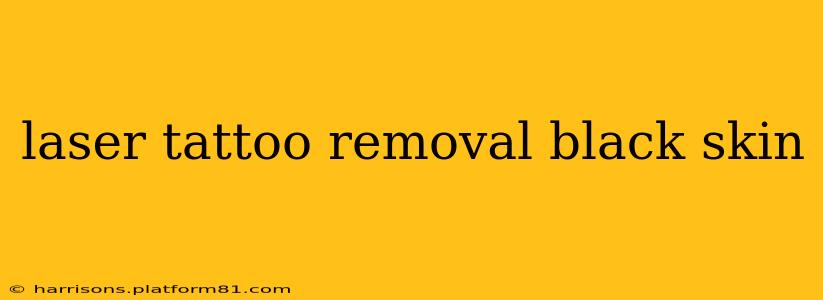Laser tattoo removal is a popular procedure, but its effectiveness and safety vary depending on skin tone. For individuals with black skin, the process requires extra care and consideration. This comprehensive guide explores the nuances of laser tattoo removal on black skin, addressing common concerns and providing valuable insights.
What are the challenges of laser tattoo removal on black skin?
Black skin contains a higher concentration of melanin, the pigment responsible for skin color. This higher melanin concentration makes it more susceptible to hyperpigmentation (darkening of the skin) or hypopigmentation (lightening of the skin) during laser treatment. The laser energy, intended to target the tattoo ink, can also inadvertently affect the melanin, leading to undesirable side effects. Therefore, a skilled and experienced technician is crucial. The procedure requires precise laser settings and meticulous aftercare to minimize these risks.
What type of laser is best for black skin?
The gold standard for tattoo removal is the Q-switched laser, particularly the Nd:YAG laser. This laser is effective in targeting a wide range of ink colors, and its longer wavelength allows for deeper penetration, suitable for dark skin tones. However, the specific settings need to be carefully adjusted by the technician based on the individual's skin type and the tattoo's characteristics. It's vital to find a practitioner experienced with this laser and its application on dark skin.
Does laser tattoo removal leave scars on black skin?
While scarring is a potential risk with any laser tattoo removal procedure, it's particularly important to note that black skin is more prone to keloid scarring (raised, overgrown scars). This is why choosing a highly experienced and skilled technician is paramount. Proper aftercare, including following the practitioner's instructions diligently, is equally crucial in minimizing the risk of scarring.
How many sessions are typically needed for black skin?
The number of sessions required for complete tattoo removal varies depending on factors such as the tattoo's size, color, age, and the individual's skin type. Generally, tattoo removal on black skin may require more sessions than on lighter skin due to the increased melanin concentration and the laser's need for more cautious settings. Patience and realistic expectations are key.
What are the side effects of laser tattoo removal on black skin?
Potential side effects include hyperpigmentation (darkening of the skin), hypopigmentation (lightening of the skin), scarring, and changes in skin texture. These risks are higher for black skin, emphasizing the need for careful selection of a practitioner and adherence to aftercare instructions. Mild swelling and redness are common and usually resolve quickly.
How can I find a qualified practitioner for laser tattoo removal on black skin?
Finding a qualified and experienced practitioner is critical. Look for someone with a proven track record of successful tattoo removal on diverse skin tones. Check their credentials, reviews, and before-and-after photos specifically showcasing their work on individuals with black skin. Consultations are essential to discuss your specific needs and concerns, allowing you to assess the practitioner's expertise and comfort level with treating your skin type. Don't hesitate to ask questions and seek clarification on any aspect of the procedure.
What is the cost of laser tattoo removal on black skin?
The cost varies depending on several factors, including the tattoo's size, location, complexity, and the number of sessions required. It's advisable to obtain a detailed cost estimate from the chosen practitioner during the consultation. Remember that the cost should reflect the experience and skill level of the practitioner, crucial for minimizing complications on black skin.
What is the aftercare process for laser tattoo removal on black skin?
Following aftercare instructions meticulously is essential for optimal results and minimizing the risk of complications. This typically involves keeping the treated area clean and protected from the sun, using recommended creams or ointments, and avoiding certain activities such as swimming or intense exercise. The practitioner will provide detailed instructions tailored to your specific needs.
By carefully selecting a skilled practitioner, understanding the potential risks and benefits, and meticulously following aftercare instructions, individuals with black skin can achieve safe and effective laser tattoo removal. Remember, realistic expectations and patience are key to a successful outcome.
